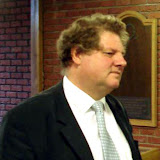One thing that must have baffled both followers and opponents was the contrast between Jesus and John the Baptist. Even the imprisoned John himself was surprised by the direction in which Jesus’s ministry was going. He sent out spies to try and ascertain if Jesus was the genuine article. The reply Jesus gives is not dissimilar to the keynote sermon he preached in
There were huge differences between John and himself: the one dour and ascetic, the other celebratory and generous but because they were both radical and threatened the status quo both would set off alarm bells in the corridors of power. Jesus then tells a story about a bunch of kids playing the pipes in the market place.
These pipes were reed instruments, loud, piercing, of rather unrefined tone. In former times they were the folk instruments of village dance ‑ ear‑splittingly loud. They were also traditionally the instruments of lament: like the Scottish bag‑pipes, they were capable of stirring emotion with their plaintiff tone.
Once upon a time the pipe had been an instrument of the prophets, too. In one of the earliest references to prophets in the Bible Saul sees a group of prophets coming down from the holy hill playing the pipes: this was not surprising since part of being a prophet was the cultic dance. Indeed these cultic prophets worked themselves up into a frenzy under the influence of the spirit of the Lord! We get some idea of what might have happened as we read about Saul stripping naked and freaking out.
By the time the temple had been built, perhaps as a result of their association with this rather ill‑disciplined worship, pipes were out. They were the instruments of the brothel and the disreputable party: the accompaniment to erotic dance. Now since the rival fertility religions involved cultic prostitution this avoidance of the pipe was quite understandable; I suppose these days the equivalent would be those who refuse to countenance guitars in church because of the association of rock bands with drugs!
By the time of Jesus, the pipes had ceased to be associated with formal Jewish religion at all: when we see them on Greek pots they are often accompanying some scene of drinking and debauchery or with times of death. All that then is the background to the text
"We piped for you and you would not dance"
Some would say that the children represent the prophets; they play the pipes but the people won't respond: it makes no difference whether it is a dance or a dirge ‑ this generation is "stiff-necked". They just can't bend to the rhythm of the song. That certainly is a strong message. But Matthew seems to have other ideas for the words that come afterwards don't follow from such an interpretation at all.
Pipe players are sitting down in the market playing for the other children and getting totally exasperated that the other children won't join in with the tunes they are playing. Not surprisingly the two activities specifically mentioned here are dancing and mourning ‑ the very two activities associated with the pipes. Apparently it was customary for boys to dance at weddings and girls at funerals: hence this may just have been a reference to the games of weddings and funerals. It should also be mentioned that the words used for dancing and mourning rhyme in Aramaic ‑ therefore Jesus may have been quoting a popular proverb.
In Matthew’s setting the pipers are the Pharisees: with all their sanctimoniousness: they sit in the market piping but they can't get the occasion right: they play nightclub music at funerals and dirges at parties ‑ then they complain that the people don't keep in step with their perverse rhythms. When John comes preaching repentance they say ‑ we're holy we don't need it. When Jesus comes with the joyful celebration of the
Ultimately both Jesus and John died to the sound of the pipes. Ironically, John whose lifelong music was the dirge (according to this text), died to the raucous vulgar measure of Salome's sensual dance: Jesus whose lifelong music was celebration, died to the wail of the lament, and the crowd went home beating their breasts (the very words Matthew uses here for mourning).
And then as if to prove the difference between himself and John had been exaggerated he launches off into a prophetic assault reminiscent of John himself on the Galilean cities of Choroazin,
It would seem that the fact that even John the Baptist was having doubts about the authenticity of Jesus’s ministry had pushed Jesus over the edge into exasperation. Presumably he had hoped for the kingdom to come with less resistance when he had set out from the
How did Jesus respond to this sense of exasperation? Matthew tells us that it was precisely then when he felt so negative about his ministry and untypically blamed the community to which he had come (perhaps not unlike the pipers he had lambasted earlier in the passage) that he turned to God in prayer to thank him for his mission. In his prayer he sees that it is not the experts who know best but the children and the poor, that he is not mistaken that God is his Father and that the fact that that is not universally recognized is of no consequence. Since no-one can know the Father except through Jesus’s own revelation means that his calling is not necessarily to success but to faithfulness to the will of God. His anger at being misunderstood and rejected melts to thanksgiving when committed to the Father in prayer. The prayer leads him to a profound self-knowledge of both his status and ministry which in turn leads to the most sublime invitation to come to him recorded in the gospel.

No comments:
Post a Comment